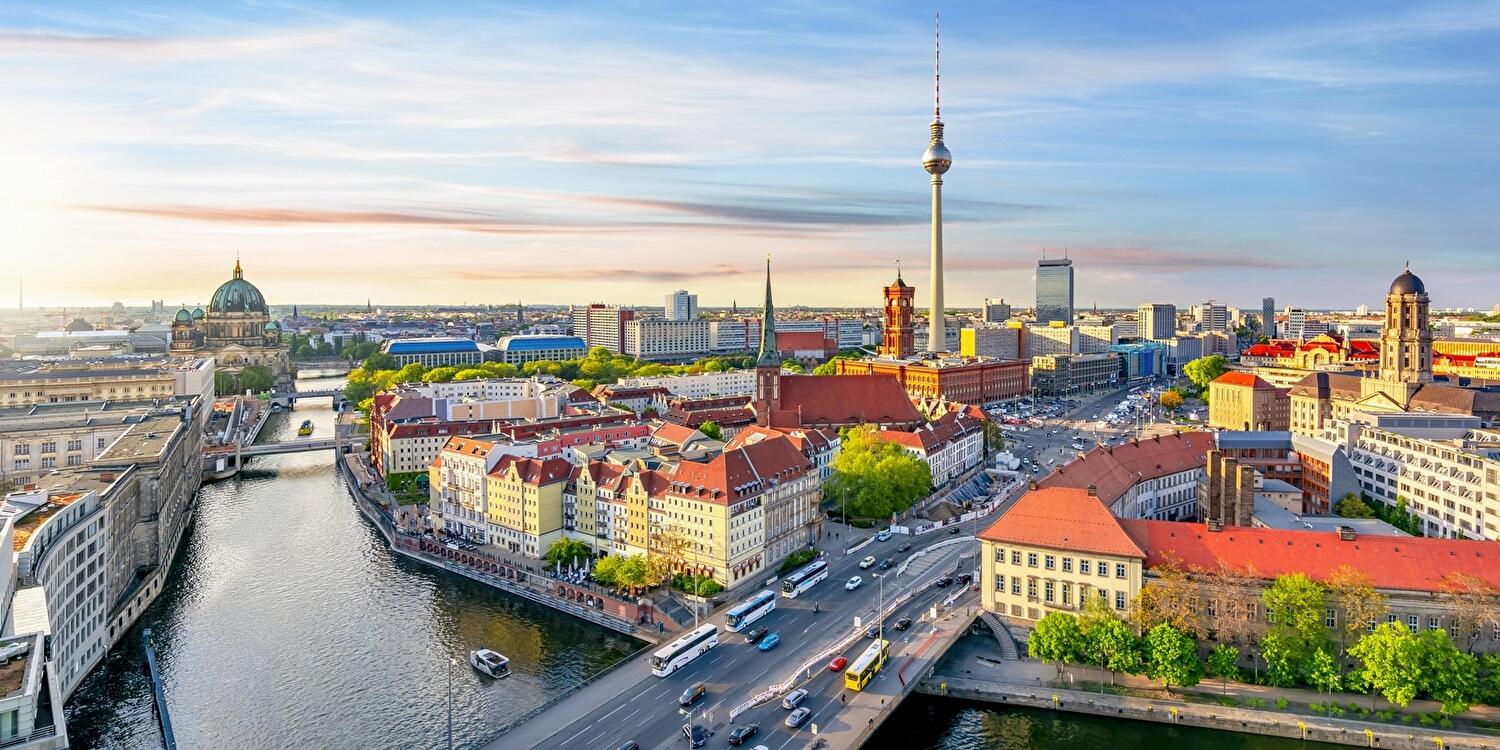CHAT
WITH US
WITH US
GET A
QUOTE
have questions? call us
+44 3330 907053
Home
/
Guides
/
Moving Guides
/
Moving to Berlin from the UK: How to Relocate to the German Capital
Moving to Berlin fro...

Moving Guides • Europe • 07 Nov 2024
Share this article
Berlin, the vibrant capital of Germany, has become an increasingly popular destination for UK expats seeking a high quality of life, a thriving cultural scene, and exciting career opportunities. With its rich history, diverse neighbourhoods, and affordable cost of living compared to other major European cities, it's no wonder that many Brits are choosing to call Berlin home. As experts in relocations to Germany, we'll take you through every step of the process, from the legal requirements to finding your perfect home and settling into life in this incredible capital city.
There are important legal requirements for living and working in Germany. As a UK citizen, your right to live and work in Germany has changed since Brexit, and it's essential to understand the new rules and regulations.
Since the end of the Brexit transition period on December 31, 2020, UK citizens are no longer EU citizens and are subject to the same rules as other third-country nationals when it comes to living and working in Germany. This means that you'll need to obtain a visa to stay in Germany for more than 90 days within a 180-day period.
The type of visa you'll need depends on your reasons for moving to Germany, such as:
It's important to note that the visa application process can take several weeks or even months, so it's essential to start the process well in advance of your planned move date. You can find more information on the specific requirements for each type of visa on the website of the German Federal Foreign Office.

Once you arrive in Berlin, you'll need to register your residence with the local authorities within 14 days. This process, known as "Anmeldung," is a legal requirement for all residents in Germany, regardless of nationality.
To register your residence, you'll need to visit the local "Bürgeramt" (citizen's office) in your district and provide the following documents:
After registering, you'll receive a "Meldebescheinigung" (registration certificate), which you'll need for various administrative tasks, such as opening a bank account or applying for a tax ID number.
Berlin offers a wide range of housing options, from modern apartments in the city centre to spacious houses in the suburbs. However, the city's popularity among expats and a growing population have led to an increasingly competitive rental market, so it's essential to start your search early and be prepared to act quickly when you find your ideal home.
Berlin is divided into 12 boroughs, each with its own unique character and charm. Some of the most popular neighbourhoods among expats include:
When choosing a neighbourhood, consider factors such as:
To find a rental property in Berlin, you can use online platforms such as:
It's also a good idea to work with a local real estate agent who can help you navigate the rental market and find properties that match your preferences and budget. Keep in mind that most rental properties in Germany come unfurnished, so you'll need to factor in the cost of furniture and appliances when budgeting for your move.
When you find a suitable rental property, you'll need to sign a rental contract ("Mietvertrag") with your landlord. The contract will outline the terms of your tenancy, including the rent amount, the duration of the lease, and any additional costs (such as utilities or maintenance fees).
Before signing the contract, make sure to:
Once you've signed the contract and paid the required deposit (typically equivalent to 2-3 months' rent), you'll be ready to move into your new home in Berlin.
Before you can fully settle into your new life in Berlin, you'll need to set up essential services such as electricity, gas, internet, and a bank account. Here's what you need to know:
In Germany, tenants are usually responsible for setting up and paying for their own utility services, such as electricity, gas, and water. To set up these services, you'll need to contact the local providers and provide them with your personal details and the address of your new home.
Some of the main utility providers in Berlin include:
It's a good idea to compare prices and tariffs from different providers to find the best deal for your needs. You can use comparison websites such as Check24 or Verivox to easily compare offers from multiple providers.
To stay connected in Berlin, you'll need to set up internet and mobile phone services. There are several major providers to choose from, including:
When choosing a provider, consider factors such as:
Keep in mind that many internet and mobile phone contracts in Germany have a minimum duration of 12-24 months, so be sure to read the terms and conditions carefully before signing up.

Opening a German bank account is essential for managing your finances and paying bills in your new home. Some of the largest banks in Germany include:
To open a bank account, you'll typically need to provide the following documents:
Many banks in Germany also offer online banking services, which can be a convenient way to manage your finances and pay bills from the comfort of your home.
Germany is known for its high-quality healthcare system, which is funded by a combination of public and private health insurance. As a UK expat living in Germany, you'll need to make sure you have appropriate health insurance coverage to access healthcare services.
If you're employed in Germany and earn less than €64,350 per year (as of 2021), you'll be automatically enrolled in the public health insurance system, known as "gesetzliche Krankenversicherung" (GKV). Your employer will deduct your contributions directly from your salary, and you'll be covered for a wide range of medical services, including:
Some of the largest public health insurance providers in Germany include:
If you earn more than €64,350 per year or are self-employed, you can choose to opt-out of the public health insurance system and take out private health insurance instead. Private health insurance, known as "private Krankenversicherung" (PKV), often offers more comprehensive coverage and shorter waiting times for appointments, but premiums can be higher than in the public system.
Some of the largest private health insurance providers in Germany include:
When choosing between public and private health insurance, consider factors such as:
It's important to note that once you opt-out of the public health insurance system and choose private health insurance, it can be difficult to switch back, so make sure to carefully consider your options before making a decision.
If you're moving to Berlin with children, you'll need to understand the German education system and the options available to your family. Here's an overview of the key stages of education in Germany:
Berlin offers a variety of public and private schools, as well as international schools that cater to the needs of expat families. Some of the most well-known international schools in Berlin include:
When choosing a school for your children, consider factors such as:
It's a good idea to start researching schools well in advance of your move to Berlin, as some international schools may have waiting lists or specific application requirements.

Berlin is a thriving hub for startups, technology companies, and creative industries, offering a wide range of job opportunities for UK expats. Some of the key sectors in Berlin include:
To find work in Berlin, you can:
When applying for jobs in Berlin, make sure to:
Keep in mind that while many international companies in Berlin use English as their working language, having a good command of German can significantly improve your job prospects and help you integrate into the local business culture.
As a UK expat living and working in Berlin, it's essential to understand your obligations when it comes to taxes and social security contributions. Here's what you need to know:
Germany has a progressive income tax system, with tax rates ranging from 14% to 45%, depending on your income level. As an employee, your income tax will be deducted directly from your salary each month.
If you're self-employed or have additional sources of income, you'll need to file an annual tax return with the German tax authorities, known as the "Finanzamt."
In addition to income tax, employees in Germany are required to make social security contributions, which cover:
These contributions are split between the employee and the employer and are deducted directly from your salary each month.
The UK and Germany have a double taxation agreement in place, which aims to prevent individuals from being taxed twice on the same income. Under this agreement, you may be eligible for tax relief or exemptions in certain situations, such as:
It's important to seek professional advice from a tax expert who specialises in cross-border taxation to ensure that you're complying with your tax obligations and taking advantage of any available tax relief or exemptions.

Moving to a new city can be both exciting and challenging, but with a little preparation and an open mind, you'll soon find yourself feeling at home in Berlin. Here are some tips to help you settle into life in the German capital:
While many people in Berlin speak English, particularly in international business and academic circles, learning German can greatly enhance your experience of living in the city. Not only will it make everyday tasks like shopping and navigating public transportation easier, but it will also help you connect with locals and fully immerse yourself in German culture.
There are many ways to learn German in Berlin, including:
Berlin is a city with a rich history, diverse neighbourhoods, and a vibrant cultural scene, so take the time to explore your new home. Some must-see attractions and experiences include:
Building a social network is key to feeling at home in a new city, and Berlin offers plenty of opportunities to meet new people and make friends. Some ways to connect with others include:
Berlin is known for its laid-back, creative, and diverse culture, so embrace the opportunity to experience something new and different. From the city's thriving arts and music scene to its eco-friendly and sustainable lifestyle, there's always something new to discover and enjoy.
Moving to a new country is a big undertaking, but with the right support and guidance, you can make your transition to Berlin as smooth and stress-free as possible. That's where Deliver1 comes in.
As a leading provider of international relocation services, Deliver1 has the expertise and experience to handle every aspect of your move to Berlin, from packing and shipping your belongings to helping you settle into your new home. Our comprehensive range of services includes:
With Deliver1 on your side, you can focus on the excitement of starting your new life in Berlin, knowing that every detail of your move is being taken care of by our team of relocation experts. To learn more about how we can help with your move to Berlin, get in touch with us today for a personalised consultation and quote.
Moving to Berlin from the UK is an exciting adventure, offering the opportunity to experience a new culture, build a rewarding career, and enjoy a high quality of life in one of Europe's most vibrant and dynamic cities. By following the steps outlined in this guide and partnering with a trusted relocation service like Deliver1, you'll be well on your way to making your dream of living in Berlin a reality. Wishing you all the best on your relocation journey!
We love hearing from you-so please get in touch with any questions or queries.
We love hearing from you-so please get in touch with any questions or queries.
Working hours
Mon - Sat: 08:00 - 17:00
Sun: Closed
Call
+44 3330 907053Location
Unit 3, Newyears Green Lane
Newyears Green
Uxbridge
UB9 6LX
United Kingdom
